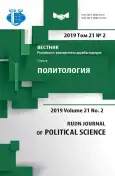THE ORIGIN OF AN IMPERIAL CONSCIOUSNESS IN THE UNITED STATES
- Authors: Spiridonova V.I1
-
Affiliations:
- Institute of Philosophy, Russian Academy of Sciences
- Issue: Vol 21, No 2 (2019)
- Pages: 268-281
- Section: THE PROBLEM OF CORRELATION BETWEEN INTERNAL AND EXTERNAL POLICY OF THE USA
- URL: https://medbiosci.ru/2313-1438/article/view/339703
- DOI: https://doi.org/10.22363/2313-1438-2019-21-2-268-281
- ID: 339703
Cite item
Full Text
Abstract
The article examines the origins of Imperial discourse formation in American political culture and geopolitics. At the end of XX - beginning of XXI century it took disguised forms - “nonterritorial Empire”, “informal Empire”, “positive Empire”, “cultural hegemony”. The latency of the US Imperial consciousness is due to a number of reasons. First, the historical fact of the struggle for liberation from the colonial rule of Britain left a deep trace in the “political imaginary” of the American people and gave rise to the belief that the United States itself has never been, is not and cannot be an Empire. The second factor was the semantic evolution that occurred in the American interpretation of power. In fact, America has not passed the historical path that developed the idea of a “monopoly on legitimate violence” in Europe. The idea of “dispersal” of power has rooted in the public consciousness the priority of the power factor, coupled with the admissibility of the use of force at own discretion. Inside, both motives were regarded by the public consciousness as democratic. The third component of imperialism became a powerful Messianic argument, the belief in the special destiny of the American nation to create an ideal society This Faith brought with them in the “terra nullis” (on “no man's land”) immigrants of the New World. This thesis has become fundamental to the public opinion and to all the leaders of America. The justification of the concept of “soft power” and “cultural hegemony” did not detract from the importance of the “power factor”, which gave rise to new forms of imperialism - the deployment of military bases and economic dictatorship. The range of American domination is characterized by great flexibility - from mutually beneficial cooperation in Europe (“Empire by invitation”) to direct military intervention into the “rogue States”.
About the authors
Valeria I Spiridonova
Institute of Philosophy, Russian Academy of Sciences
Author for correspondence.
Email: vspirid@yandex.ru
Doctor of Philosophy, Main Research Fellow, Head of the Department of the Philosophical Problems of Politics, Institute of Philosophy, Russian Academy of Sciences
Moscow, Russian FederationReferences
- Arrighi G. Loss of Hegemony-II. Prognosis. 2005; 3 (4): 6—36. Available from: http://www.prognosis.ru/prog/autumn_2005.pdf. Accessed: 24.01.2019 (In Russ.).
- Mikhailov S. The Ideology of American Exceptionalism and its Historical Roots. Analytics. 20.02.2016. Available from: https://riss.ru/analitycs/26992. Accessed: 14.01.2019. (In Russ.).
- Hunt M. Between the Empire and the Hegemony: Turmoil in American Politics. Polis. Political research. 2008; 6: 7—10 (In Russ.).
- Alain J. L’empire du chaos. Les Républiques face à la domination américaine dans l’aprèsguerre froide. P.: La Découverte; 2002. 224 p. (In Fr.).
- Friedmann M.P. From Manila to Baghdad: Empire and the American Mission Civilisatrice at the Beginning and End of the 20th Century. Revue française d’études américaines. 2007; 113: 26—38.
- Guerlain P. Le retour du discours impérialiste aux États-Unis. Revue française d’études américaines. 2007; 3 (113): 5—25. Available from: https://www.cairn.info/revue-francaise-d-etudesamericaines-2007-3-page-5.htm. Accessed: 23.12.2018 (In Fr.).
- Golub P.S. Un goût de sang dans le jungle: L’empire américain revisité. Mouvements. 2009; 57: 160—173 (In Fr.).
- Ignatieff M. Empire Lite: Nation-Building in Bosnia, Kosovo and Afghanistan. L.: Vintage; 2003. 144 p.
- Kagan R. The Benevolent Empire. Foreign Policy. 1998; 111: 24—35.
- Mann M. Incoherent Empire. London & New York: Verso/Norton; 2003. 278 p.
- Mann M. Impérialisme économique et imperialism militaire américains. Un renforcement mutuel? Actes de la recherche en sciences socials. 2008; 1: 20—39. doi: 10.3917/arss.171.0020. Available from: https://www.cairn.info/revue-vingtieme-siecle-revue-d-histoire-2010-2page-143.htm. Accessed: 04.02.2019 (In Fr.).
- Mélandri P. Le déclin de l'empire américain? La fin des Empires. P.: Éditions Perrin; 2016: 449—469 (In Fr.).
- Mennell St. The American Civilizing Process. Cambridge: Polity Press; 2007. 400 p.
- Mennell St., Poncharal B. L'histoire, le caractère national et la civilisation américaine. Vingtième Siècle. Revue d'histoire. 2010; 2: 143—159. Available from: https://www.cairn.info/revuevingtieme-siecle-revue-d-histoire-2010-2-page-143.htm. Accessed: 15.01.2019 (In Fr.).
- Nye J.S. L'équilibre des puissances au XXIe siècle. Géoéconomie. 2013; 2 (65): 19—29 (In Fr.).
- Paine Th. Common Sense. Philadelphia. 1776. Available from: http://www.revolutionary-warand-beyond.com/common-sense-text.html. Accessed: 10.01.2019).
- Spirenburg P. Democracy Came Too Early: A Tentative Explanation for the Problem of American Homicide. American Historical Review. 2006; 111: 104—114.
- Vaicbourdt N. L'empire de la Liberté ou le déni d'Empire américain. Monde(s). 2012; 2: 67—77.
Supplementary files









